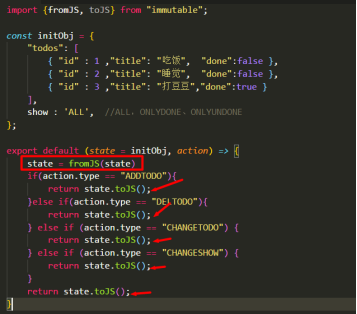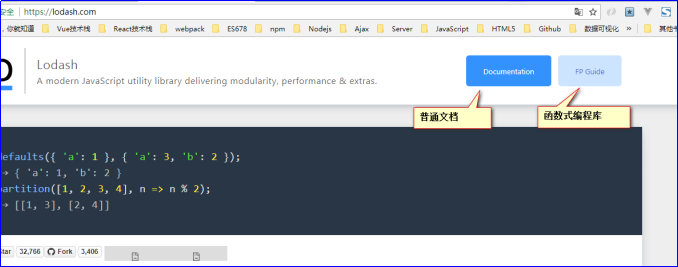一、ES6的Set、Map数据结构
Map、Set都是ES6新的数据结构,都是新的内置构造函数,也就是说typeof的结果,多了两个:
Set 是不能重复的数组
Map 是可以任何东西当做键的对象
ES6 提供了新的数据结构 Set。它类似于数组,但是成员的值都是唯一的,没有重复的值。

let s = new Set(); s.add(1); s.add(2); s.add(3); s.add(3); s.add(3); s.add(4); s.add(5); console.log(s)

集合中添加数据用add()方法,会自动过滤已经有的元素。
最快的数组去重方法:
let s = new Set([1,2,3,3,3,4,5]); console.log([...s])


let s = new Set([1,2,3,4,5]); console.log(s.size) console.log(s.has(5)) console.log(s.delete(5)) console.log(s)

集合的关注点是在元素里面,而不关注顺序,所以不提供s[0]来枚举某项API,但是可以转为数组[...s]
JavaScript 的对象(Object),本质上是键值对的集合(Hash 结构),但是传统上只能用字符串当作键。这给它的使用带来了很大的限制。
为了解决这个问题,ES6 提供了 Map 数据结构。它类似于对象,也是键值对的集合,但是“键”的范围不限于字符串,各种类型的值(包括对象)都可以当作键。也就是说,Object 结构提供了“字符串—值”的对应,Map 结构提供了“值—值”的对应,是一种更完善的 Hash 结构实现。如果你需要“键值对”的数据结构,Map 比 Object 更合适。

let m = new Map(); const o = {a:1,b:2}; m.set("haha", 123); m.set(o, 456) m.set(888,789) console.log(m) console.log(m.get(o))

使用get()来得到元素的值,key是区分类型的。
二、函数式编程库
所谓的“函数式编程”指的是程序中的函数的是“纯函数”,就表示一个函数不改变传入的参数。
我们之前大量使用...、filter、map等等操作,略微麻烦,就有3个特别好用的函数式编程库应运而生。
2.1 immutable.js库
2.1.1概述
来自Facebook,是官方推荐的库,immutable表示不可变。immutable总是返回新的对象,不会修改原对象。
immutable不是深拷贝对象,创造性的使用DIFF算法,有一个结构共享机制,它所做的是智能分析改变,让改变后的元素可以共享改变之前的一些结构。
Immutable 使用了 Structural Sharing(结构共享),即如果对象树中一个节点发生变化,只修改这个节点和受它影响的父节点,其它节点则进行共享。
{ a:{"x":1 , "y":2}, b:{ c:{"x":3, "y":4}, d:{"x":5}, } }
{ a:{"x":1 , "y":2}, b:{ c:{"x":8, "y":4}, d:{"x":5}, } }
上面代码中,颜色相同部分,还是内存中同一个对象。
2.1.2基本讲解
官方:http://facebook.github.io/immutable-js/docs/#/
安装依赖:
npm install immutable --save
immutable提供了两个数据类型:
List和Map是immutable自己封装的一个类,List是不可变的数组,Map是不可变的对象。

fromJS() 将一个原生js数据类型转换为immutable类型的数据
toJS() 将一个immutable类型的数据转换为JS类型的数据。
List()和Map() 用来创建新的List和Map对象(将原生JS对象和数组转换到不可变的Map和List)
immutable思维:
先用fromJS()或List()或Map()将原生JS的数组、对象、变为List、Map对象
然后再操作,比如对数组的push操作
最后.toJS()将immutable对象变为原生JS的数组、对象
在Nodejs环境中引包:
var immutable = require("immutable"); var List = immutable.List const list1 = List(["白板","幺鸡","三条","三万"]) const list2 = list1.push("四条") console.log(list1.toJS()) console.log(list2.toJS())
会发现push之后,原数组没有改变,只返回了新数组。
上面案例是用List(原数组)将数组变为List对象,也可以用fromJS。
var immutable = require("immutable"); var fromJS = immutable.fromJS const list1 = fromJS(["白板","幺鸡","三条","三万"]) const list2 = list1.push("四条") console.log(list1.toJS()) console.log(list2.toJS())

数组的头尾操作,也不会改变原数组,都是返回新数组:

var immutable = require("immutable"); var fromJS = immutable.fromJS const list1 = fromJS(["白板","幺鸡","三条","三万"]) const list2 = list1.push("四条") const list3 = list1.pop() const list4 = list1.unshift("东风") const list5 = list1.shift() console.log(list1.toJS()) console.log(list2.toJS()) console.log(list3.toJS()) console.log(list4.toJS()) console.log(list5.toJS())

更改set
set表示更改下标为2的项为“二筒”,注意不会真的改变原数组,而是返回新数组:
const list1 = fromJS(["白板","幺鸡","三条","三万"]) const list2 = list1.set(2,"二筒");

对象也有set
const obj1 = fromJS({"a" : 1, "b" : 2 ,"c" : 3})
const obj2 = obj1.set("b",888)
console.log(obj1.toJS())
console.log(obj2.toJS())

在数组中查找某一项,使用find(),寻找某一项下标用findIndex()
得到Map对象的某一个键的值,要用get()方法
var immutable = require("immutable"); var fromJS = immutable.fromJS const data = fromJS([ {"id" : 1, "name" : "小明", "age" : 12}, {"id" : 2, "name" : "小红", "age" : 12}, {"id" : 3, "name" : "小强", "age" : 13}, ]) const item = data.find(item=>item.get("id") == 2); console.log(item.toJS())

删除用delete,删除下标为2的项
const list1 = fromJS([111,222,333,888,999]); const list2 = list1.delete(2); console.log(list1.toJS()); console.log(list2.toJS());

is()函数验证是否相等
var {is , Map} = require("immutable"); let o1 = Map({a : 1, b : 2, c : 3}); let o2 = Map({a : 1, b : 2, c : 3}); console.log(o1 == o2); //在内存中不相等 console.log(is(o1,o2)); //在immutable世界中是相等

2.1.3真实项目场景
真实项目场景 - 增加todo,用set设置,用get获取
var immutable = require("immutable"); var fromJS = immutable.fromJS const data = fromJS({ "todos" : [ {"id" : 1,"title" : "吃饭", "done" : false }, {"id" : 2,"title" : "睡觉", "done" : false }, {"id" : 3,"title" : "打豆豆", "done" : false }, ], "show" : "ALL" }) const newData = data.set( "todos", data.get("todos").push({"id" : 4,"title" : "打架", "done" : false}) ) console.log(newData.toJS())

真实项目场景 - 删除id为2的todo,使用delete(2)
//删除id为2的项 const newdata = data.set( "todos", data.get("todos").delete(data.get("todos").findIndex(item=>item.get("id")== 2) )); console.log(newdata.toJS());
方法2:
const newData = data.set( "todos", data.get("todos").filter(item=>item.get("id") != 2) )

真实项目场景 - 改变id为2的项title为“吃鸡”
方法1
var index = data.get("todos").findIndex(item=>item.get("id") == 2); var item = data.get("todos").get(index) const newData = data.set("todos",data.get("todos").set(index, item.set("title","吃鸡"))); console.log(newData.toJS())
方法2
const newData = data.set("todos",data.get("todos").map(item=>{
return item.get("id") == 2 ? item.set("title" , "吃鸡") : item;
}))

2.1.4和redux结合
改造TodoList项目:

只改变reducers中的文件夹的写法,其它地方一律不改。
state的数据依然是原生JS的数组和对象,只不过在reducer函数运行中,瞬间变成为immutable的List和Map了,但是出去的时候就toJS了,里外里,state还是原生数组、对象。
import {fromJS , toJS} from "immutable"; const initObj = { "todos" : [ {"id" : 1 , "title" : "吃饭" , "done" : false}, {"id" : 2 , "title" : "睡觉" , "done" : true}, {"id" : 3 , "title" : "打豆豆" , "done" : true} ], "show" : "ALL" } export default (state = initObj, action) => { //下面的语句很重要,变为immutable对象 state = fromJS(state); if(action.type == "ADDTODO"){ return state.set("todos", state.get("todos").push( { "id" : state.get("todos").reduce((a,b)=>{ return b.get("id") > a ? b.get("id") : a }, 0) + 1, "title" : action.title, "done" : false } )).toJS(); }else if(action.type == "DELTODO"){ return state.set( "todos", state.get("todos").filter(item=>item.get("id") != action.id) ).toJS(); }else if(action.type == "CHANGETODO"){ return state.set( "todos", state.get("todos").map( item => item.get("id") == action.id ? item.set(action.k, action.v) : item ) ).toJS(); }else if(action.type == "CHANGESHOW"){ return state.set("show", action.show).toJS(); } return state.toJS(); }
2.2 Ramda.js库
纯函数,也叫作“兰姆达函数”,就是ramda这个词。http://ramda.cn/
2.2.1函数柯里化基础
函数柯里化(Currying),是把接受多个参数的函数变换成接受一个单一参数的函数,并且返回接受余下的参数,而且返回结果的新函数。柯里化函数就是逐步传参,逐步缩小函数的适用范围,逐步求解的过程。
简单的加法函数:
function add(x,y){ return x + y; } add(2,3);//5
如果用函数柯里化接受两个参数的函数变成单一参数,如下:

function add(x) { return function (y){ return x + y } } console.log(add(2)(3))
2.2.2基本讲解
npm install ramda --save
数组尾插一项:
var R = require("ramda"); var arr1 = ["红中","白板","幺鸡"]; var arr2 = R.append("一筒", arr1) var arr3 = R.append("二筒")(arr1) console.log(arr1) console.log(arr2) console.log(arr3)
被操作的元素放到最后一个参数。

数组头插一项:

var R = require("ramda"); var arr1 = ["红中","白板","幺鸡"]; var arr4 = R.prepend("发财",arr1) console.log(arr4)

2.2.3真实项目场景
改变对象的b属性为8
这里使用了非常重要的方法R.lensProp()聚焦到某属性,功能就是让改变的值从原基础上进行修改
var R = require("ramda"); const obj1 = {"a" : 1,"b" : 2,"c" : 3} const obj2 = R.set(R.lensProp("b") , 8, obj1) console.log(obj2)

删除id为2的项:
const state = { "todos": [ {"id" : 1, "title" : "吃饭", "done" : false}, {"id" : 2, "title" : "睡觉", "done" : false}, {"id" : 3, "title" : "打豆豆","done" : false} ], "show":"ALL" } //删除id为2的项 const newstate = R.set(R.lensProp("todos"), R.filter(item=>item.id != 2, state.todos) , state); console.log(newdata)

修改id为2的项title为吃鸡
const newstate = R.set(R.lensProp("todos"),R.map(item => item.id == 2 ?
R.set(R.lensProp("title"),"吃鸡",item) : item , state.todos), state);

修改show为ONLYDONE
const newstate = R.set(R.lensProp("show") , "ONLYDONE", state);

基本上一条语句能够解决问题,不再写...了,并且相比如immutable,没有Map、List和对象、数组的转换。
2.2.4和redux结合
还是用todolist举例,在reducers/index.js中修改,下面标黄色的语句的R.__是占位符:
var R = require("ramda"); const initObj = { "todos" : [ {"id" : 1 , "title" : "吃饭" , "done" : false}, {"id" : 2 , "title" : "睡觉" , "done" : true}, {"id" : 3 , "title" : "打豆豆", "done" : true} ], "show" : "ALL" } export default (state = initObj, action) => { //R.__表示占位符,下面调用setTodos时,就等于传入了要更改成为的值 const setTodos = R.set(R.lensProp("todos"), R.__ , state); const setShow = R.set(R.lensProp("show") , R.__ , state); if(action.type == "ADDTODO"){ return setTodos(R.append({ "id" : state.todos.reduce((a,b) => b.id > a ? b.id : a, 0) + 1, "title" : action.title, "done" : false },state.todos)); }else if(action.type == "DELTODO"){ return setTodos(state.todos.filter(item=>item.id != action.id)); }else if(action.type == "CHANGETODO"){ return setTodos(state.todos.map(item=>item.id == action.id ? R.set(R.lensProp(action.k), action.v, item) : item)) }else if(action.type == "CHANGESHOW"){ return setShow(action.show); } return state; }
2.3 lodash.js库
2.3.1基本讲解
实际上underscore.js已经在“函数库工具”输给了lodash,lodash完全可以替代underscore。
中文:http://www.css88.com/doc/lodash/
npm install --save lodash

underscore有的函数,lodash全有,比如数组去重和最大最小值:
var _ = require("lodash"); var arr1 = [3,3,3,3,4,4,4,4,5,5,5,5,3]; var arr2 = _.uniq(arr1); console.log(arr1); console.log(arr2); console.log(_.max(arr1)); console.log(_.min(arr1));

lodash中有子包,叫做fp。fp是functional programing函数式编程的意思。
需要引入这个包
var fp = require("lodash/fp");
更改b属性为8:

var fp = require("lodash/fp"); var obj1 = {"a" : 1 , "b" : 2 , "c" : 3}; var obj2 = fp.set("b" , 8 , obj1); console.log(obj1); console.log(obj2);

和ramda一样,被操作对象写最后一个参数。
2.3.2真实项目场景
删除
var fp = require("lodash/fp"); const state = { "todos" : [ {"id" : 1 , "title" : "吃1饭" , "done" : false}, {"id" : 2 , "title" : "吃2饭" , "done" : false}, {"id" : 3 , "title" : "吃3饭" , "done" : false} ], "show" : "ALL" }; //删除id为2的项 const newstate = fp.set("todos", state.todos.filter(item => item.id != 2), state); console.log(state); console.log(newstate);
增加:
const newstate = fp.set("todos", fp.concat( state.todos, { "id" : state.todos.reduce((a,b) => b.id > a ? b.id : a, 0) + 1, "title": "吃鸡", "done" : false } ) , state);
修改id为2的项的title为“吃鸡”
const newstate = fp.set("todos",state.todos.map(item=>item.id == 2 ? fp.set("title", "吃鸡", item) : item), state);
如果遇见比较难的场景,此时可以用克隆方法,比如在第2项之间插入一项

const _todos = fp.clone(state.todos) //更改克隆之后的数组 _todos.splice(2,0,{"id": 4,"title":"游泳","done":false}) //更改state const newstate = fp.set("todos", _todos, state) console.log(state) console.log(newstate)

const car = { "cars" : { "a" : [ { "name" : "奥迪" , "series" : [ { "name" : "A6", "type" : "豪华轿车" }, { "name" : "A4", "type" : "豪华轿车" } ] }, { "name" : "奥拓", "series" : [{"奥拓1号" : 2}] } ], "b" : [ {"奔驰" : 1} ] } } //改变A6的车系为普通轿车 var newstate = fp.cloneDeep(car); newstate.cars.a[0].series[0].type = '普通轿车'; console.log(JSON.stringify(newstate))
2.3.3 和redux结合
import fp from "lodash/fp"; const initObj = { "todos" : [ {"id" : 1 , "title" : "吃饭" , "done" : false}, {"id" : 2 , "title" : "睡觉" , "done" : true}, {"id" : 3 , "title" : "打豆豆" , "done" : true} ], "show" : "ALL" } export default (state = initObj, action) => { if(action.type == "ADDTODO"){ return fp.set("todos" , fp.concat(state.todos , { "id" : state.todos.reduce((a,b) => b.id > a ? b.id : a , 0) + 1, "title" : action.title, "done" : false }), state); }else if(action.type == "DELTODO"){ return fp.set("todos" , state.todos.filter(item => item.id != action.id) , state); }else if(action.type == "CHANGETODO"){ return fp.set("todos", state.todos.map(item=>item.id == action.id ? fp.set(action.k,action.v,item) : item) , state); }else if(action.type == "CHANGESHOW"){ return fp.set("show" , action.show , state); } return state; }
三、异步
3.1搭建服务器
我们将所有前端的东西都放入www文件夹中。
Node.js写app.js实现数据接口:

var express = require("express"); var app = express(); app.use(express.static("www")) app.get("/api",(req,res)=>{ res.json({"result":8}) }) app.listen(3000);
3.2 redux-thunk解决异步
我们现在有四个文件都没有地方适合写异步:components、actions、constants、reducer。
所以React提供了react-thunk包,thunk是中间件,所谓的中间件就是在发出action和reducer进行改变的中间,要做的事。
https://www.npmjs.com/package/redux-thunk
安装依赖:
npm install --save redux-thunk
main.js
import React from "react"; import ReactDOM from "react-dom"; import { createStore, applyMiddleware} from "redux"; import { Provider } from 'react-redux' import thunk from 'redux-thunk' import reducers from "./reducers/index"; import logger from "redux-logger"; //引入父组件 import App from "./containers/App"; //创建Redux store 仓库用来存放状态 const store = createStore(reducers, applyMiddleware(logger, thunk)) ReactDOM.render( <Provider store={store}> <App></App> </Provider>, document.getElementById('app') )
components/counter/index.js组件,按钮点击之后做addServer:
<button onClick={()=>{this.props.counterActions.addServer()}}>加服务器那么多</button>
此时actions/counterActions.js文件中,就可以写异步函数了:
两步:第一步请求服务器数据,第二步发出action。将服务器的返回结果,当做载荷发给reducer。
import {ADD , MINUS , ADDSERVER} from "../constants/COUNTER.js";
//同步阵营,直接返回一个Action
export const add = () => ({"type" : ADD});
export const minus = () => ({"type" : MINUS});
//异步有两个(),第一个()接受按钮传的参数,第二个()是系统给你的dispatch和getState
//export const addServer = (n)=> (dispatch, getState)=>{
// alert(n)
// alert(dispatch)
// alert(getState().counter.v)
//}
export const addServer = ()=> async (dispatch , getState) => {
//发出Ajax请求,实际上是fetch请求,fetch不是Ajax
const {result} = await fetch("/api").then(data=>data.json());
//发action,因为唯一能改变reducer的方法就是dispath一个action
dispatch({"type" : ADDSERVER , result})
}
constants/COUNTER.js
export const ADDSERVER = "ADDSERVER_COUNTER";
reducers/counter.js
import {ADD , MINUS , ADDSERVER} from "../constants/COUNTER.js";
export default (state = {"v" : 0} , action) => {
if(action.type == ADD){
...
}else if(action.type == MINUS){
...
}else if(action.type == ADDSERVER){
return {
"v" : state.v + action.result
}
}
return state;
}
如果使用fetch,要安装babel插件:babel-plugin-transform-runtime
babel把async await翻译成浏览器都不认识的语句了,所以要用插件解决,不让babel翻译:
const path = require('path');
module.exports = {
entry : "./www/app/main", // 入口
output: {
path: path.resolve(__dirname, "www/dist"), // 出口文件夹
filename: "bundle.js" // 出口文件名
},
watch : true, // 自动检测变化,进行打包
module: { // 配置一些插件
rules: [
{
test: /.js$/, // 所有.js结尾的文件
loader: "babel-loader", // 都要使用babel-loader处理
include: [path.resolve(__dirname, "www/app")],
exclude: [path.resolve(__dirname, "node_modules")],
options: {
presets: ["env" , "react"],
plugins: ["transform-object-rest-spread", "transform-runtime" ]
}
}
]
}
}
现在讲解重要知识,如何从服务器上请求默认数据,此时要通过:

结合Echarts.js使用
app.js服务端出数据接口:

var a = 0; var b = 0; var c = 0; app.get("/api2" , (req,res)=>{ res.json({ "result": [ { value: a, name: '清晰' }, { value: b, name: '一般' }, { value: c, name: '懵逼' } ] }); }); //投票接口 app.get("/toupiao/:zimu" , (req,res)=>{ var zimu = req.params.zimu; if(zimu == "a") a++; if(zimu == "b") b++; if(zimu == "c") c++; res.json({ "result": [ { value: a, name: '清晰' }, { value: b, name: '一般' }, { value: c, name: '懵逼' } ] }); }); app.listen(3000);
containers/App.js
import React from 'react'; import {connect} from "react-redux"; import Counter from "../components/counter/index.js"; import Pie from "../components/pie/index.js"; export default class App extends React.Component { constructor(props) { super(props); } render() { return ( <div> <Counter></Counter> <Pie></Pie> </div> ); } }
components/pie/index.js组件的构造函数中调用函数:
import React from 'react'; import {connect} from "react-redux"; import {bindActionCreators} from "redux"; import * as pieActions from "../../actions/pieActions.js"; class Pie extends React.Component { constructor(props) { super(props); ///组件还没上树时,发异步请求数据 props.pieActions.loadServer(); } //组件已经上树,然后初始化echart结构 componentDidMount(){ this.pic = echarts.init(this.refs.pic); } //React开发中没有回调函数的,所以数据回来了,在组件将要更新的生命周期写 //组件将要更新,为什么会将要更新,因为reducer中的result变了! //为什么它变了,因为fetch回来了,从而发出dispatch,影响result了。 componentWillUpdate(nextProps){ //这是百度的图表插件标准写法,就是一个配置,最重要的是最后一项data,来自服务器 var option = { tooltip: { trigger: 'item', formatter: "{a} <br/>{b}: {c} ({d}%)" }, legend: { orient: 'vertical', x: 'left', data: ['清晰', '一般', '懵逼'] }, series: [ { name: '懵逼指数', type: 'pie', radius: ['50%', '70%'], avoidLabelOverlap: false, label: { normal: { show: false, position: 'center' }, emphasis: { show: true, textStyle: { fontSize: '30', fontWeight: 'bold' } } }, labelLine: { normal: { show: false } }, //这里呈递数据 data: nextProps.result } ] }; //设置option,组件就能显示图表了 this.pic.setOption(option); } render() { return ( <div> <p>结果:{this.props.result}</p> <div ref="pic" style={{"width":"300px" ,"height":"300px"}}></div> <button onClick={()=>{this.props.pieActions.toupiao('a')}}>清晰</button> <button onClick={()=>{this.props.pieActions.toupiao('b')}}>一般</button> <button onClick={()=>{this.props.pieActions.toupiao('c')}}>懵逼</button> </div> ); } } export default connect( ({pie})=>({ result: pie.result }), (dipatch)=>({ pieActions: bindActionCreators(pieActions, dipatch) }) )(Pie);
actions/pieActions.js中写异步请求数据
export const loadServer = () => async (dispatch , getState) => { //异步请求数据 const {result} = await fetch("/api2").then(data=>data.json()); //存储到reducer dispatch({"type" : "LOADSERVER" , result}); } export const toupiao = (zimu) => async (dispatch, getState) => { const { result } = await fetch("/toupiao/" + zimu).then(data => data.json()); dispatch({ "type": "LOADSERVER", result }); }
reducers/pie.js要处理action的工作
export default (state = {"result" : []} , action) => {
if(action.type == "LOADSERVER"){
return {"result" : action.result};
}
return state;
}
reducers/index.js
import {combineReducers} from "redux";
import counter from "./counter.js";
import pie from "./pie.js";
//暴露合并的reducer
export default combineReducers({
counter ,
pie
});

